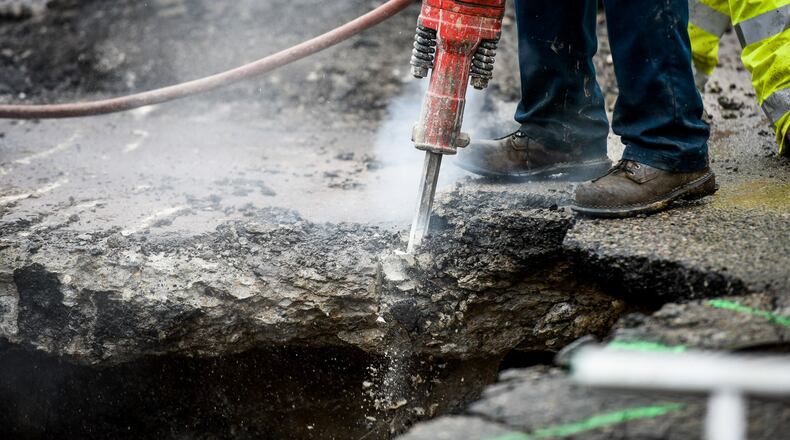The severe breaks would be those under busy roadways or near schools, hospitals, nursing homes or businesses. Also, large leaks can cause problems for flow within other areas of the water system.
“We’ve had a few main breaks in the last week, but nothing out of the ordinary,” Thornsberry said. “We typically expect to have a few main breaks in the winter months, so we were prepared for it.”
From Jan. 1 through early Friday afternoon, Hamilton’s water utility experienced four main breaks and the need to replace five curb-valves, which link water mains to properties’ water pipes, said Jim Williams, Hamilton’s public works director.
From Dec. 11-31, there were 11 main breaks.
“The change in weather did trigger a good portion of that,” Williams said.
“Because this city was built in 1791, and we have an aging infrastructure, it’s continuous. Things happen. Maybe not in the frequency that’s going on right now during the cold weather, but it happens.”
Hamilton and Butler County are among the majority of utilities that are substituting older cast-iron mains with ductile iron ones, which are significantly more durable.
Hamilton has about 300 miles of water mains and tries to replace 2-3 miles of them a year. The pipes now being installed may last a century, the city has said.
There have been situations in which buildings were flooded because owners didn’t heat their buildings and pipes froze, Williams said.
“Water mains are typically buried anywhere from four to 10 feet underground, so usually, for weather to impact the water mains, it has to be extremely drastic,” Thornsberry said. “More often than not, the breaks are caused by the age of the pipes, the various soils that are around the pipes. Very rarely is weather the lone consideration in causing a main break, because they are buried beneath the frost line.”
Butler County’s water service has about 650 miles of water mains and serves West Chester, Liberty and Fairfield townships, mainly in the southwestern part of Butler County, with some of the pipes dating back to the 1960s.
“We target the areas of our system that are the oldest. We also target cast-iron pipe and the areas where we’ve had water-main breaks,” to remove the oldest and most vulnerable parts of the system, at a rate of one to two miles per year, Thornsberry said.
Avoiding water issues
Some tips from Butler County and Hamilton water officials about ways to avoid frozen pipes in your buildings:
• Pipes are most susceptible for freezing if they are located in an outside wall, under a sink on an outside wall, or in unheated crawl-spaces. When it’s very cold, open kitchen and bathroom cabinets with water pipes to let warmer room air circulate. Also, put heaters near such cabinets.
• When temperatures drop below 0 degrees Fahrenheit, and nobody is home, turn on a faucet slightly so it trickles slightly. That will keep water moving and help avoid freezing. When people are home, they will use water, which will keep the water moving.
• Wrap susceptible pipes with electrical heat tape. Also, insulate pipes with foam insulation wrap, especially those in unheated areas.
• Also, remove hoses from outdoor faucets and turn off the outside supply using the valve inside the house.
About the Author
